- Home
- William Styron
The Suicide Run: Five Tales of the Marine Corps Page 14
The Suicide Run: Five Tales of the Marine Corps Read online
Page 14
For a long time in the early hours of the morning I was unable to sleep. I lay on my cot staring up at the dark canopy of the tent, listening to the big spooky moths that every now and then bumped, with a flicker of soft wings, against the mosquito netting. Once in a while I’d hear another Superfortress rising in the distance from the airfield on Tinian, and far off down the coast there was the faint steady hammering of a pile driver where the Seabees were building a new pier. Hang me! Hang me! spoke the voice of the machine. Close by, a weird bird kept up a disturbance of flirtatious twitters in the jungle; closer still, beneath me, the snails on the plywood made their clumsy crackling. I focused on their sounds one by one, as if by distracting myself long enough I might avoid drifting down tributaries of thought into those swampy visions that would mire me in absolute despair. From their breathing I could tell that Stiles and Veneris were deep in slumber, and this caused me an even more hyped-up wakefulness; shit, how could they sleep, how could anyone sleep after the colonel’s evil prophecy?
By brooks too broad for leaping
The lightfoot boys are laid;
The rose-lipt girls are sleeping
In fields where roses fade.
Under my flashlight’s gleam I pored over the cluster of Housman poems in my Pocket Book of Verse, letting the sorrow and resignation take hold of my spirit; there was a note both stoical and ill-omened in this pastoral requiem, and it mated perfectly with my enervation, my feeling of doomsday. I despised myself for being so spineless and disabled, so demoralized, but I could do nothing to avoid the mudslide slowly enveloping me. Finally I put the book aside and lay gazing upward into darkness. I couldn’t fight the fatigue any longer and drifted off into a shadowland where fantasy mingled with dream, and I was soon staring down an abomination: myself on D-day, coming undone. Now I saw myself as a figure in a newsreel, a running target. The beachhead was engulfed in flame. The ramps went down and I lurched forward onto the harsh ground, beckoning the platoon to follow me. I stumbled ashore through clouds of phosphorus and across an undulating terrain traversed by barriers of wire. A Jap machine gun, a Nambu, chattered from the flank and the air was thick with shrapnel, roiling, incandescent; the ground rocked with explosions. I turned to see my men hustling low as they scattered and deployed themselves at the edge of an embankment; some guys were falling now, still clutching their rifles at the instant of their collapse into the sand. I glimpsed white bones and blood, flowing like a sacrament. And just then, frozen with the sight of so much blood, I sank into paralysis. I could make no movement, nor speak a word; in the grip of an overpowering numbness I let my mind shut down. Nearby, one of my squad leaders questioned me with his eyes: Lieutenant, what’ll we do? Beyond power of thinking, I made no reply. Through billows of smoke I saw my tentmates; I could tell that Veneris on my right and Stiles on my left were advancing steadily with their men. Over the radio I heard my company commander’s frantic roar: Get your troops moving! But the command was without force, without meaning; it could have been shouted in an unknown tongue. My immobility was complete, as if tendrils of myself had burrowed down and sought root in the soil of Japan, rendering me into brainless vegetation. Yet most intolerably—sickening and intolerable—was the look in the eyes of Stiles and Veneris, who, glancing back as they moved through the visible swarm of enemy bullets, turned upon me their measureless scorn and loathing …
Coming awake, awash in sweat, I felt my pounding heart, and I thought I’d made a strangled noise loud enough to arouse my friends. But they still slept. For what seemed hours I lay still, listening to their breathing. They would have to be sleeping, I thought at last, when on that not-too-distant night I would fulfill the promise I’d made to myself and enact the lonesome little farce I’d rehearsed so many times before. I was almost ready. Until this moment, I’d never allowed myself to rehearse the first detail of the plan that would lead me into the jungle. But now I let my arm fall to the side of the cot, and I touched with my fingers the cold metal of the carbine cradled in its rack above the flooring. Beneath my hand the barrel of the weapon was oily and slick, and I caressed its surface for long minutes as if touch in itself were reassurance and consolation. Then I drew back my arm. The thought of the coming night filled my mind like an ecstatic heartbeat. What night it would be I didn’t know, only that there would be such a night for certain, and soon—the night when at last I stole out of the tent into the cricketing darkness, and there amid the hibiscus and flame trees destroyed my fear forever.
I detected an auspicious note in Isabel’s voice when she called from the kitchen and announced, as I began climbing upstairs, that she was brewing some more coffee. “You’ll find it in the electric percolator,” I heard her say. “It keeps hot. It’s a new Westinghouse. Just pour it yourself if you want some later.” A speck of cordiality, a soupçon of warmth—could it be that a golden sunbeam was shining in on the stormy weather of our relationship? I sent back over the banister my thanks and proceeded upward to my room. I was beginning to feel better about my stepmother, ready to shuck once and for all the various recriminations I’d stored up for so long, even those I knew were most justified (including the time I overheard her denounce me to my father, after I came in mildly soused at three A.M., as a “degenerate with paranoid tendencies”). Maybe we could live and let live, and the three of us could form an amiable bond of sorts. God, I hoped so.
Mamie Eubanks had disposed herself—I could see down from my bedroom window—upon an aluminum Sears Roebuck chaise longue in the dinky backyard which adjoined our own. She was wearing a two-piece floppy sunsuit, quite chaste in appearance at a time when postwar bathing attire was just starting to exploit the concept of fleshly exposure; still, I could discern her eyewink of a navel and a nice pink tummy which she was presently smearing with Coppertone. Mamie had splendid legs. She propped up against them a copy of The Robe, a bloated wartime best-selling novel about the Crucifixion, and this encouraged me a little about the rapport I hoped we’d achieve, for while The Robe (which I’d actually tried to read) was a witless piece of inspirational claptrap written by a preacher (like Mamie’s father), it did have pretensions to literacy and was a cut well above the fundamentalist religious tomes I expected her to be absorbed in. We might be able to talk about bookish matters.
Just then, her father appeared. A hulking broad-shouldered man, country-bred, he had a ruddy face and the muscular presence of one who had done much manual labor. I had only talked to him on a few occasions and found him polite and soft-spoken with the gawky reticence of an unlettered pastor from the backwoods of Southside Virginia. I suspect he knew I was an infidel. We’d had very little to say to each other, and while his manners were gentle I also sensed something watchful and tightly wound about him; his eyes could grow murky and his jaw become set and grim. I imagined when the holy spirit of the evangel took a firm grip on his tailbone he could really get worked up into a frenzy, especially about sin; I wouldn’t want to cross him. Now I saw him approach Mamie and she, looking up, beamed brightly while he stroked her blond curls with fatherly affection and, after some whisperings I couldn’t make out, gave a laugh and said, “Praise the Lord!” That’s what they must shout at each other all the time, I thought—that and “God love you!” and “Yes, Jesus!” What a fucking family. As I continued my vigil from my peeping tom’s roost I saw her absently hike up the hem of her sunsuit bottom, exposing a fetching amount of upper thigh as she vigorously scratched herself there. For some reason it was profoundly arousing. But it also made me feel like a spy. The heat was becoming truly a menace, and I turned away, thinking I’d try to wash away my lust.
Showering off in my tiny bathroom, I made plans for another summer day. I had once again the foretaste of idleness alternating with creative effort. I actually caught myself joyously shivering in the knowledge of my freedom. It was as if I’d recovered from some near-fatal disease. I still was not used to my leisure. I’d almost forgotten that on this morning I hadn’t been forced to jump out of b
ed before dawn, nor would I have to stand in jungle mud while a torrent of rain filled my mess kit, or become comatose with boredom at a lecture on foot care, or eat a foul meal of unnameable particulars, or wait in futile nauseous hope for a letter in the mail, or salute some repellent fathead of a captain (of which the marines, despite its high standards, had a few) or … the catalog went on forever. Civilian pleasures were like an ongoing rapture. In fact, hardly once in my Marine Corps career, except during those precious few days of leave, had I had the time to saturate myself in a shower, as I was doing now, for as long as I damned well pleased. An old ditty popped into mind: Hallelujah, I’m a bum … Hallelujah, bum again!
After the shower I dressed in one of my more ample sport shirts and baggy slacks—no more form-fitting khaki, binding at armpit and crotch. I glanced at the telephone and was instantly galvanized into a decision. Mamie Eubanks. Any further delay would cause me to lose my resolve for good. While gawking again into Mamie’s backyard I dialed her number, indelibly memorized, then simultaneously heard its ring and saw its summoning effect on Mamie; she leaped up, threw The Robe on the ground, and scampered into the kitchen. I developed a fist-sized lump in my chest and began to breathe in deep unnatural inhalations. I was so afraid I might betray my feelings—my nervousness, my fear, my unseemly hots—that I was on the verge of slamming down the receiver when I was stopped by the sound of her chirpy voice: “Eubanks residence. Good morning.”
“This is Paul, Paul Whitehurst,” I said. “Howya doing, Mamie?”
“Paul? You mean Paul next door? Oh Paul, I’m glad to hear from you!” The tone was encouragingly receptive.
“I just thought I’d call you up.” My throat produced an unseemly tremolo as I spoke. “Your momma told me the other day that you’d be back from wherever it was you were. Was it down in Carolina?”
“Yes, I was in summer school at Bible college. Out near Boone, in the mountains. It was so cool there. I can’t believe this heat, can you? It’s like a furnace.”
“Weatherman said it was supposed to cool off a little late in the afternoon.” I hesitated, then pressed on: “Look, Mamie. I was wondering if you might not be free tonight. We could have a bite to eat, go for a ride.”
There was long, rather intimidating silence. Finally she said: “I don’t know, Paul. I’d really like to. But my daddy likes me to be home early.”
“How early?”
“Ten o’clock.” She’s twenty years old, I thought, and her old man’s still keeping watch like a Weimaraner.
“Well that’s all right,” I replied. “I could get you back by then.” I had begun to gain confidence.
“Also,” she went on, “I’ve got choir practice at five-thirty I wouldn’t be able to get away till seven.”
Three hours for fun, or whatever. We discussed the matter in detail. I began to feel better. Despite the impediments she was placing in my way, I was relieved that my scheme was falling smartly into an operational mode. I could still pick her up at the First Baptist Church (where I might dally long enough to see her in her robes, watch her lovely face uptilted as she sang “What a Friend We Have in Jesus” or perhaps “Leaning on the Everlasting Arms”), cruise by the Peninsula Drive-In for a hamburger, and yet have time enough—an hour and a half, perhaps two—to park at the secluded overlook by the World’s Greatest Harbor, where, on the broad front seat of my father’s secondhand but immaculate Pontiac, I would become more closely acquainted with this creature. For there was no doubt about it: she had me hopelessly snared, and I could scarcely believe that I’d let myself fall for a dewy Christian seraph. All my wiser instincts told me that I was headed not for bliss but its antipodean double—trouble—yet I could not help myself. “Mamie,” I said, just before hanging up, “I’ll see you at the church at seven.”
“God bless,” she replied, disheartening me.
Before heading downstairs for a cup of Isabel’s coffee I rummaged through my dresser drawer and placed certain items in my pockets, preparing for the daily foray into town. Handkerchief, cigarettes, Zippo lighter. I’d recently bought a new Swank wallet to replace the one I’d hung on to out of sentiment but for sanitary reasons had had to dispose of: months in the Saipan boondocks had made its crevices crummy with an odorous green mold. Into the new model I slipped a crisp new twenty-dollar bill, which should last me for most of a week, especially since my drinking spot down in the center of town still soaked its customers only five cents for a large glass of draft beer, ten cents for a bottle. Financially, I could hardly be regarded as a plutocrat, though for a bachelor I felt solvent enough owing to the largess of the government; veterans like me who belonged to what had been dubbed the “52-20 Club” received a check for twenty dollars each week for a year, payoff of sorts by the U.S. Treasury Department for getting out of the mess alive.
I put the wallet with the twenty dollars in my hip pocket, and as I did so my eyes lit upon one of the three souvenirs I had brought back from the Pacific. Marines, crazy for Jap souvenirs, scavenged mementos of all descriptions from the gore of the battlefields: Samurai swords, flags, I.D. bracelets, officers’ pistols, fancy leather belts, watches, rifles, combs, rice bowls, almost anything one could yank off a corpse.
Some keepsakes were particularly loathsome—gold teeth, dehydrated body parts such as fingers and toes, acquired by the few marines most likely capable themselves of atrocities. I knew a corporal of my battalion who carried with him two prunelike talismans—the dried testicles of a soldier he had personally dispatched in the frenzy of battle on Tarawa. He didn’t seem to me a monstrous sort though, and in fact I thought him rather nice; saving a couple of Jap’s nuts was really the expression of a marine’s immeasurable hatred of the enemy—a hatred felt by nearly all marines—which most stateside Americans could not fathom.
I had acquired a shiny bayonet of tempered steel. Also a flag with the Rising Sun. But my most valued souvenir was the small round locket I’d won one steaming night on Saipan in a poker game. Luck alone might not have accounted for the prize—I wasn’t all that sharp a poker player—but the loser of the locket, a regular warrant officer from regimental headquarters, was half-pissed from a bottle of Gordon’s gin he’d won that same night in another game and so gave up the lovely bibelot on a dopey call. The locket was worth winning. It was exquisite: burnished gold inlaid with an ivory Jap ideograph in filigree and suspended by a delicate chain. It had a nice heft and a satiny feel when I stroked it. For a long while, rather stupidly, I had thought it to be a solid object, not noticing that it opened up as lockets are supposed to do and in this case revealed a photograph. It was a snapshot taken on a ferryboat. Two little girls who appeared to be sisters—I judged about four and five years old—gazed over the back of a deck chair; they wore identical straw hats with bows tied at the front, and they looked like owlets with their eyes solemn and depthlessly dark.
The picture at first disturbed me; I came close to gouging it out and throwing it away. It added a measure of squeamish self-reproach to the discomfort I already felt at owning such a memento, with its hint of the macabre. But to destroy the charming portrait was an act of such self-conscious guilt that it seemed absurd; the empty space would be an even greater reproach. So I kept the picture in the locket and from time to time stole a peek at the ferryboat children, always making my mind an absolute blank whenever my thoughts began to stray toward the father from whose dead neck my trophy had been torn.
Downstairs Isabel had retired to the alcove off the living room that served as a kind of makeshift office. She was not an idle housewife. As a part-time occupation she still taught nursing at the nearby hospital, which kept her busy with written examinations and paperwork, and she also seemed to spend many hours doing what I gathered were benevolent things for the Episcopal Church; as much as she pained me, and as unbearably narrow as I viewed most of her perspectives, I had to concede that her heart was sometimes in the right place. She believed in charity, not only because her church plumped for the
eleemosynary spirit but because (it was like swallowing nails for me to admit it) she did have an impulsively generous side; this took such an elemental form as feeding any of the stray cats that roamed the neighborhood or, in fact, feeding me—after all, she didn’t have to bestow upon me the good breakfast I had just downed that morning. I felt like a shit (for an instant) for so grudging her occasional moments of grace; the sound of her fingers devotedly clacking away at her typewriter gave me a twinge of what might actually have passed for loving-kindness.
But it was just a twinge and over immediately. I poured a cup of coffee from Isabel’s new Westinghouse percolator. Listening to the voice of Lou Rabinowitz on the radio—the voice of Isabel’s nemesis—I realized that her New York Jew had managed to achieve a promotional coup perhaps unprecedented in the Old Dominion. For surely never before in the annals of Virginia crime—at least in the annals of those four dozen Negro men who over the decades had shambled to their extinction for having forcible sexual congress with a white woman—did a wretched felon find such a champion as Lou Rabinowitz. It was he who had summoned the chutzpah to get Booker Mason on the front pages and cause the notoriously reactionary Virginia media to publicize what he called the “monumental” injustice about to take place that evening in Richmond. And he plainly relished his champion’s role. His voice had the querulous tonality of the Bronx, along with all the dental consonants, but it also possessed the rabbinical fervor of a man who was descended (as he was quick to point out in regard to his name) from a long line of rabbis.
“What, then, is the next step, Lou?” asked the male interviewer.
“Since the Supreme Court has once again abdicated its responsibility, we have only one option left and that is to request that the governor grant clemency.”

 Selected Letters of William Styron
Selected Letters of William Styron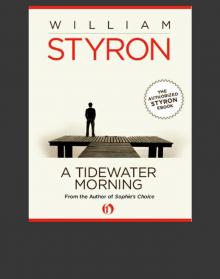 A Tidewater Morning
A Tidewater Morning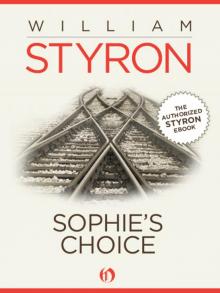 Sophie's Choice
Sophie's Choice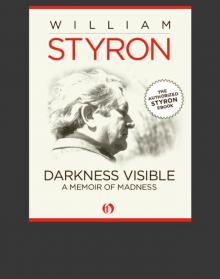 Darkness Visible: A Memoir of Madness
Darkness Visible: A Memoir of Madness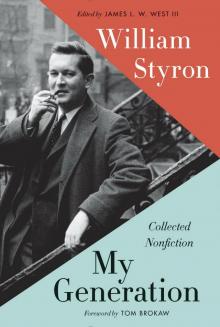 My Generation: Collected Nonfiction
My Generation: Collected Nonfiction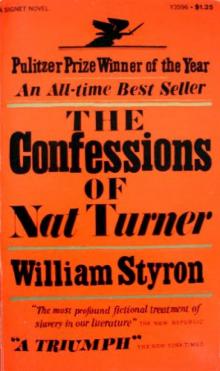 The Confessions of Nat Turner
The Confessions of Nat Turner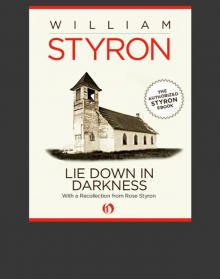 Lie Down in Darkness
Lie Down in Darkness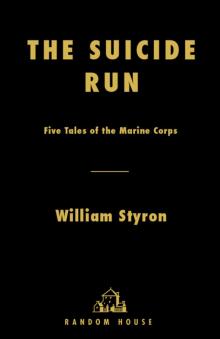 The Suicide Run: Five Tales of the Marine Corps
The Suicide Run: Five Tales of the Marine Corps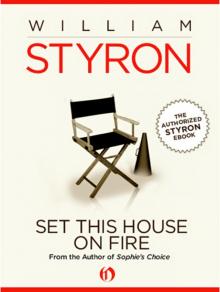 Set This House on Fire
Set This House on Fire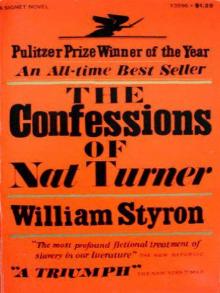 Confessions of Nat Turner
Confessions of Nat Turner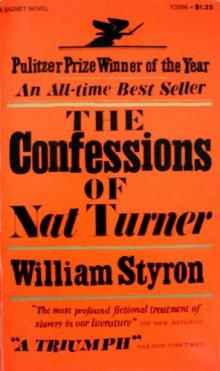 The Confessions of Nat Turner (1968 Pulitzer Prize)
The Confessions of Nat Turner (1968 Pulitzer Prize)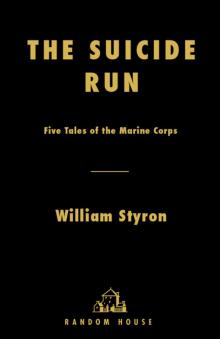 The Suicide Run
The Suicide Run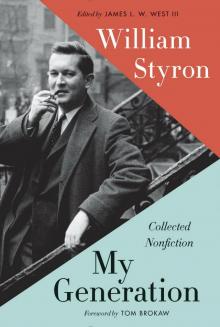 My Generation
My Generation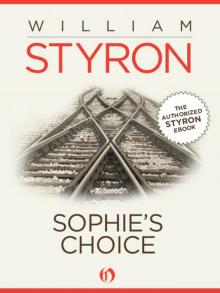 Sophie's Choice (Open Road)
Sophie's Choice (Open Road)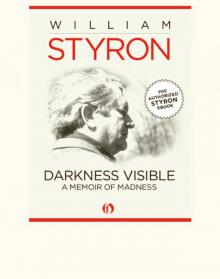 Darkness Visible
Darkness Visible